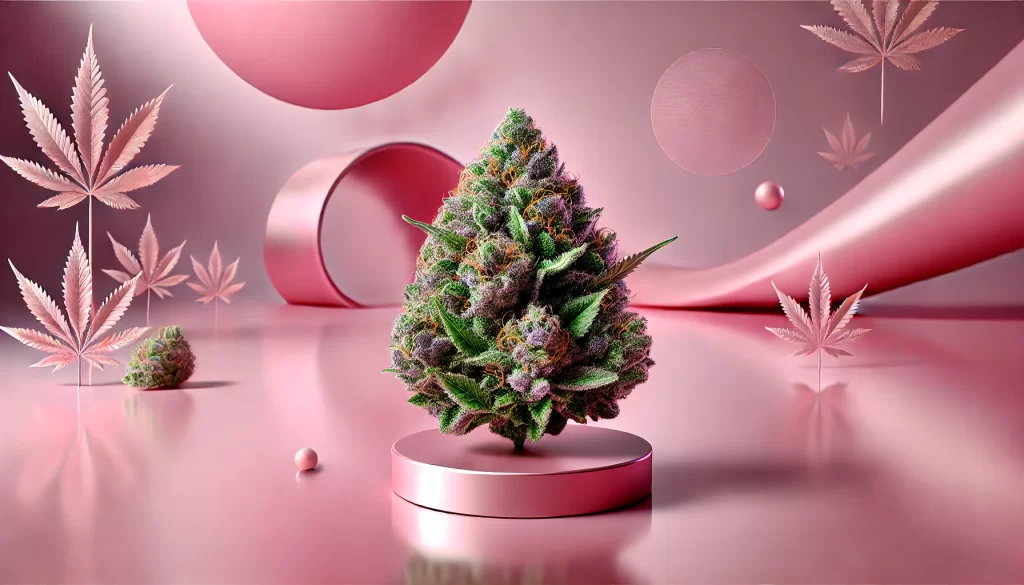If you’re looking for a perfectly balanced hybrid that delivers both deep relaxation and mental uplift, Cherry Pie might be your ideal match. With its sweet, dessert-like aroma reminiscent of freshly baked cherry pie, this indica-dominant hybrid has won over both recreational users and medical patients alike.
In this in-depth Cherry Pie strain review, we’ll break down its genetics, effects, medical benefits, and growing tips. Discover why this strain is a top choice for stress relief, chronic pain, and mood enhancement.
What Is the Cherry Pie Strain?
Cherry Pie is a legendary hybrid created by crossing two iconic strains:
- Granddaddy Purple (GDP): A potent indica known for full-body relaxation and vibrant purple hues.
- Durban Poison: A pure sativa from South Africa, famous for its energizing cerebral effects.
This powerhouse combo results in a strain with 16-24% THC and minimal CBD (under 1%), making it strong yet approachable for most consumers.
Cherry Pie Strain Highlights
- Genetics: Granddaddy Purple x Durban Poison
- Type: Indica-dominant hybrid (60-80% indica)
- Flavor: Sweet cherry, mixed berries, earthy spice
- Aroma: Baked pastry, fruity, with a peppery kick
- Key Effects: Euphoria, muscle relaxation, stress relief
Cherry Pie Effects: What to Expect
Cherry Pie delivers a perfect balance of physical calm and mental stimulation. Here’s what you’ll experience:
1. Instant Happiness & Uplift
- Fights stress and anxiety with mood-boosting euphoria.
- Great for socializing or creative sessions.
2. Body Relaxation Without Heaviness
- Relieves tension without couch-lock (unlike heavy indicas).
- Best for late afternoon or evening use.
3. Medical Benefits
Thanks to its myrcene, limonene, and caryophyllene terpenes, Cherry Pie may help with:
- Chronic pain (arthritis, migraines)
- Anxiety & depression
- Mild insomnia (at higher doses)
Possible Side Effects
- Dry mouth & eyes (common with most strains)
- Mild dizziness if overconsumed
- Rare paranoia in sensitive users
Lineage & Genetics: The Best of Both Worlds
This strain inherits the best traits from its legendary parents:
- Granddaddy Purple brings deep relaxation and sweet, earthy flavors.
- Durban Poison adds a clear-headed, uplifting buzz.
The result? A well-rounded hybrid that satisfies both indica and sativa lovers.
Flavor & Aroma: Like Dessert in Weed Form
Cherry Pie’s terpene profile is a true standout:
- Dominant notes: Ripe cherry, berry pie, and warm spices.
- Smoke taste: Sweet and earthy with a fresh herbal finish.
Top terpenes include:
- Myrcene (muscle relaxant)
- Limonene (mood enhancer)
- Caryophyllene (anti-inflammatory)
Growing Cherry Pie: Tips for Success
Thinking of cultivating this strain? Here’s what you need to know:
🌱 Ideal Conditions
- Indoor: Flowers in 8-9 weeks, yielding 400-450g/m².
- Outdoor: Can produce up to 500g per plant in warm, sunny climates.
- Height: 3-6 ft (may need pruning in tight spaces).
⚠️ Difficulty Level
- Moderate: Susceptible to mold—good airflow is a must!
- Best for growers with some experience.
Related Strains & Alternatives
If you like Cherry Pie, you might also enjoy:
- Purple Punch (similar relaxing, fruity vibes)
- Blueberry Pie (another sweet, balanced hybrid)
- Wedding Cake (potent euphoria & dessert flavors)
Final Verdict: Is Cherry Pie Worth Trying?
✅ Yes, especially if you want:
- A balanced hybrid that won’t knock you out.
- A delicious, dessert-like flavor profile.
- Relief from stress, pain, or anxiety without heavy sedation.
❌ Not the best if:
- You need a strong sleep aid (try Granddaddy Purple instead).
- You’re THC-sensitive (opt for a milder strain).
Where to Find It?
Cherry Pie is popular in U.S. and Canadian dispensaries. Look for it in flower, concentrate, or edible form!
FAQs About Cherry Pie
🔹 Is Cherry Pie more indica or sativa?
It’s an indica-dominant hybrid (60-80%), but its sativa genetics keep it from being too sedating.
🔹 Does it help with insomnia?
Higher doses may help, but heavier indicas (like Northern Lights) work better for sleep.
🔹 How strong is the THC?
Ranges from 16-24%, depending on phenotype and growing conditions.
🔹 Is it hard to grow?
Requires good climate control and airflow—not for complete beginners.

